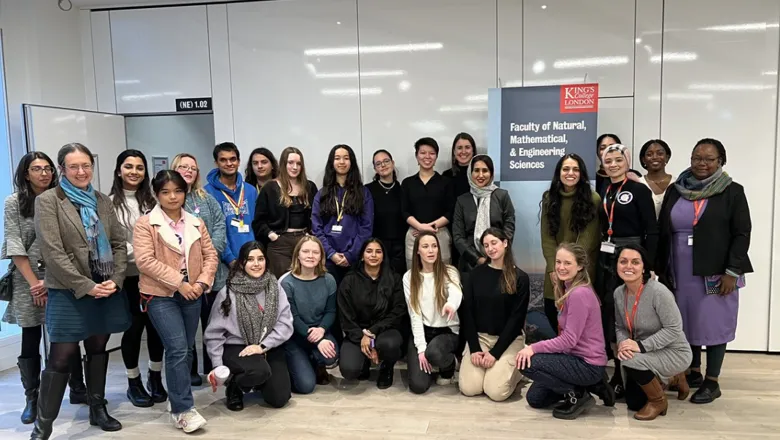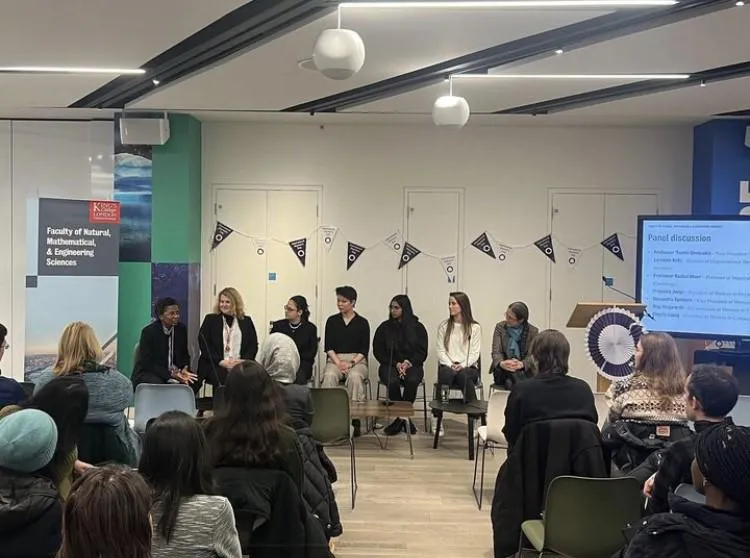The thing that keeps me awake at night…is how do you find more black women professors let alone professors of STEM if you look behind you and there’s no one coming behind you?”
Professor Funmi Olonisakin
16 March 2023
International Women's Day event discusses how we reach equity in STEMM funding
Professor Rachel Oliver discussed her research on the stark funding gap between male and female researchers including minoritised groups

Marking International Women’s Day, an event on dismantling barriers faced by women in STEMM (science, technology, engineering, mathematics, and medicine fields) was held by the Faculty of Natural, Mathematical & Engineering Sciences (NMES).
The event included a lecture titled “Who gets to do research? Equity in STEMM viewed through a funding lens,” by Professor Rachel Oliver from the University of Cambridge and a panel discussion of senior leaders and presidents of student societies followed by a networking event.
Watch the event
Sharing her paper on the significant gap in research funding allocated to men and women, Professor Oliver discussed data from the Engineering and Physical Sciences Research Council (EPSRC) showing that men are more than twice as likely to receive funding as women for the largest grants.
The data also revealed even poorer outcomes for Black researchers and those of other minoritised ethnicities. In 2018-2019, only 10 Black Principle Investigators (PIs) were awarded grants across the whole of UKRI, compared with 2000 white PIs, no data was included on sex because the numbers were so small.
Professor Rachel Oliver argued that the gender funding gap prevents women from succeeding in engineering and the physical sciences at the highest level, and is a driver of the gender pay gap in science research. She said,
"When the value of the grant is significantly less than our male counterparts, there are wide ranging consequences for women’s careers. It not only drives the gender pay gap, but can also reduce women’s influence in strategic decision making and deprives early career women of relatable role models at the top of their field."

The talk went on to discuss recommendations on how to tackle these inequities, calling for greater analysis of diversity in grant funding - both qualitative and quantitive, not only by research funders but also academic institutions. Professor Oliver also advocated for co-creating initiatives with minority communities to broaden access to the research ecosystem.
"Addressing these issues is fundamentally a question of fairness to women and other minoritised colleagues, but it is also important to note that there is increasing evidence that more diverse teams outperform homogeneous ones," said Professor Rachel Oliver.
The talk was followed by a panel disccusion exploring this topic with speakers including:
- Professor Funmi Olonisakin - Vice President (International, Engagement and Service)
- Lorraine Kelly - Director of Organisational Development/ Equality, Diversity and Inclusion
- Priyanka Jorge - President of Womxn in Physics student society
- Meg Illingworth - Co-president of Womxn in STEM student society
- Charlie Leong - President of Women in Computer Science student society
Professor Funmi Olonisakin, discussing the issues that prevent racial and ethnic minorities from entering and remaining in academia, she said,
King’s Director of Organisational Development & EDI, Lorraine Kelly said, “every single one of us is accountable for this," and encouraged the audience to contribute to these issues through mentoring, budling networks and communities to make change, "even if we don’t feel like we’ve got a lot of power."
In the panel, Student Society leads Priyanka, Charlie, and Meg all emphasised the significance of collective efforts in addressing systemic inequality. The panelists stressed that everyone regardless of their gender needs to play an active role in promoting gender parity within the STEMM fields.
The panel concluded that everyone needs to recognise and take responsibility for addressing the inequities in our current systems, as this has the potential to benefit all scientists.
